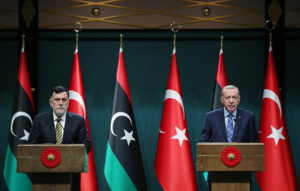
There are few fraught relationships of international politics that are purely recent phenomena. There is almost always a deeper, historical basis for the hostility experienced between two states. The poor relations between Greece and Turkey are not simply the product of recent competition over natural gas in the eastern Mediterranean, but rather the latest chapter in two centuries of animosity. The 21st of March of this year marks the bicentennial of the Greek declaration of independence and the beginning of its bloody war of liberation against the Ottoman Empire, the historical predecessor of the modern Turkish state. In the years since Greek victory in this war, there have been six conflicts [1] in which Greece and Turkey have been enemies, with numerous crises and war scares in between. With the current Turkish government displaying neo-Ottoman characteristics, history is being brought to the forefront of their foreign policy. In order to understand the current animosity between Greece and Turkey, it is vitally important to look at the history of their relationship and the constant competition between the two states.
From the moment that Greek independence was confirmed in the London Protocol and Treaty of Constantinople, relations between the new kingdom and the Ottomans would be defined by tension and competition. Despite its small size, the new Greek state considered itself a successor state to the Byzantine Empire and therefore a direct rival to the Ottoman Empire. Throughout the nineteenth century, Greece sought to create a ‘greater’ kingdom, uniting the ethnic Greek population. This was pursued through various claims to Ottoman territory, initially with failed interventions against the Ottomans such as in the Crimean War (1853-56). However, their greatest successes came between 1912 and 1921, during the final demise of the Ottoman Empire and the birth of the modern Turkish state. Through success in the First Balkan War (1912-13), the Kingdom of Greece roughly doubled in size, entirely at the expense of the Ottomans. Greece would also go on to fight against the Ottomans during the First World War and the new Turkish state during their own war of independence. The latter of these conflicts, saw a large scale population exchange as well as atrocities committed by both sides against ethnic Greeks and Turks. Given the brutality of this conflict, relations between Greece and the new republican Turkish state began with deeply held feelings of distrust and an instinct to compete rather than co-operate. In the last two hundred years, Greece and Turkey have only fought on the same side of a conflict one, the Second Balkan War (1913). This was as co-belligerents not as allies and while both states are today part of the NATO alliance, this has not produced a new era of Greco-Turkish cooperation.
While the current Greek state may not have any Byzantine aspirations, throughout the past two centuries the Hellenic kingdom and subsequent republic has sought to replace the Ottoman-Turks as the dominant power in the Eastern Mediterranean. The key to achieving this dominance would be through naval power, controlling the routes from the Mediterranean to the Aegean.
Both Greece and the then Ottoman Empire considered themselves seafaring states, the former with a large number of islands to defend and the latter with a long, vulnerable coastline in Anatolia. During both the Greco-Turkish War (1897) and the First Balkan War (1912-13), Greece enjoyed its greatest successes against the Ottomans through the deployment of superior naval force. A powerful Greece at sea is therefore an understandable anxiety for the Turkish state as policymakers are all too aware of the historic difficulty there has been in defending the Anatolian coast. The current naval arms race between Greece and Turkey, with both sides expanding their surface and sub-surface capabilities, will only exacerbate these strategic concerns.
Throughout the nineteenth and early twentieth centuries, successive Greek governments sought to expand their territory further into the Mediterranean and the Aegean. This was first seen through the peaceful transfer of the Ionian Islands from Britain in 1864, followed by aggressive expansion through several conflicts including the Balkan Wars and the First World War. The end of the Second World War saw the transfer of the Dodecanese Islands from Italy, bringing Greek territory even closer to the Turkish coast, now only twenty-five miles away. While Turkey does not dispute Greece’s holdings in the Aegean, the current tension is a new variation of the historic competition for control of the Eastern Mediterranean.
The current dispute over access to natural gas in Eastern Mediterranean demonstrates the continued relevance of the historic themes that have characterised Greco-Turkish relations. While the competition over these resources also includes Egypt, Israel and Cyprus, at its heart it is a dispute between Athens and Ankara. The possibility of access to new mineral wealth is a hugely important opportunity for any state, especially two that have suffered recent economic woes. While it is Turkey that have taken the far more aggressive approach, with extensive exploration and deployment of naval assets, the Greeks have shown their willingness to engage in brinkmanship.
In the eyes of the governments of Greece and Turkey, in order to profit from these new resources, the other state must backdown. There is to be no mutual benefit, no cooperation. Whichever state gains access to these new natural gas deposits will be able to establish a vast zone of economic control over the Eastern Mediterranean, effectively achieving the long desired maritime dominance in the region. To some Turkish analysists, the current dispute is being viewed as another opportunity for Turkey to reverse some of the losses from the collapse of the Ottoman Empire. This is through the establishment of a ‘blue homeland’, with a clear zone of Turkish maritime control in the Mediterranean and the Aegean, a neo-Ottoman vision endorsed by Erdogan which would help to redress some of the losses to Greece and Cyprus in the post-independence era.
The Ottoman Empire may have collapsed ninety-nine years ago but the legacy of its demise is still alive and well in modern Greco-Turkish relations. Whether it be in the continued disputes over the Turkish occupation of Northern Cyprus or the competing claims over the natural resources of the Mediterranean, it is the most recent chapter in a two-hundred-year-old relationship defined by tension and rivalry. Too often analysts treat current diplomatic problems as purely modern phenomena, ignoring the historical trajectory within which they sit. This does not mean that crises suddenly become resolvable when policymakers understand their historical origins, but in the case of Greece and Turkey it means that one can appreciate that this goes far deeper than merely a tug of war over natural gas deposits. Nonetheless, we should not be wedded to historical determinism when looking at modern international relations. The tension which has dominated Greco-Turkish relations demonstrates that any lasting solution must be a compromise which can satisfy some, but not all, of each side’s aims. As long as both opt for a winner takes all approach, the hostility of centuries past will continue to define the present.
[1] Emmanuel Karagiannis, ‘The Coming Arms Race in the Eastern Mediterranean’ Royal United Services Institute (July 2021)
[2] Wars in which Greece and Turkey/Ottomans were on opposing sides: Crimean War, Greco-Turkish War, First Balkan War, First World War, Turkish War of Independence, Turkish Invasion of Cyprus
[3] Christopher Clark, Sleepwalkers: How Europe Went to War in 1914 (Penguin, 2012)
[4] Vasileios Th. Meichanetsidis, ‘The Genocide of the Greeks of the Ottoman Empire, 1913–1923: A Comprehensive Overview’ Genocide Studies International, Vol. 9, No. 1 (2015)
[5] Peter Kincaid Jensen, ‘The Greco-Turkish War, 1920-22’ International Journal of Middle East Studies, Vol. 10, No. 4 (November 1979)
[6] Vassilis K. Fouskas, ‘Uncomfortable Questions: Cyprus, October 1973-August 1974’, Contemporary European History, Vol. 14, No. 1 (February 2005)
[7] Galip Dalay, ‘Turkey, Europe, and the Eastern Mediterranean: Charting a way out of the current deadlock’ Brookings Institute (January 2021)
[8] Patrick Wintour, ‘How a rush for Mediterranean gas threatens to push Greece and Turkey into war’ The Guardian (September 2020)


